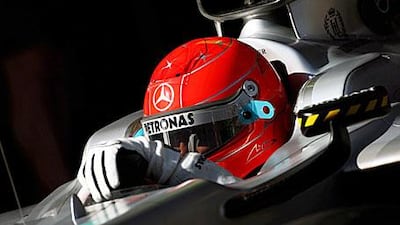When Michael Schumacher said back in January that he had returned to Formula One with the Mercedes GP team to win more world titles, it would have been more of a surprise if he hadn't. The seven-times world champion may have nothing left to prove to the world, but his comeback gives him an opportunity to finish with Formula One on his own terms. When he walked away at the end of the season in 2006, Schumaker was unhappy that Kimi Raikkonen had been forced on him as a teammate at Ferrari for the following year and concerned for the future of his then teammate Felipe Massa.
He did so despite still being extremely fast - often at least half-a-second quicker than Massa in his final season in qualifying. To put that into context, the Brazilian has since proved to be one of the fastest drivers over a single lap on the grid but, despite that, he could not get anywhere near Schumacher in their one season together. Between 1991 and 2006 the name Schumacher was synonymous with victory as he dominated the sport like no driver had before him.
Seven championships, 91 race triumphs, 68 pole positions and 154 podiums; all records and indicative of just how much Schumacher reigned during his first spell in the sport. Now, after three years out of the series he is back at the age of 41 and his presence on the grid for Sunday's Bahrain Grand Prix has made what already promised to be a captivating campaign even more intriguing. For a start, there is the anticipation of seeing him race against compatriot Sebastian Vettel and Lewis Hamilton for the first time. The cream of the current crop of young drivers facing off with the past master promises much on paper.
The German claims he is returning purely for the fun of it. "I have nothing to prove to anyone about my age," he has said. "I just have to prove to myself that I am obviously still able. But the main reason I am doing this, is because I am thrilled about it." Only a neck injury sustained in a motorbike race last year prevented him from making a return with Ferrari after Massa's accident in Hungary. Recovered, there is now no physical reason for him not to be on top of his game.
So how is he going to do? Well, even if he is a slightly slower version of his pre-retirement self, that is still going to make him one of the fastest men in the series on pure pace. What is going to make or break the comeback, however, is the machinery he is given by Mercedes, who during the off-season took over last season's constructors' champions Brawn GP. Testing has been difficult to gauge, with even Schumacher saying it was hard to tell who had the edge. One advantage that Schumacher does appear to have is the fact that he has experience of Formula One without refuelling. He and Rubens Barrichello are the only two drivers on the grid who were racing during the last period when refuelling was banned, which ended in 1993. Despite having won twice under those regulations, Schumacher does not believe he will have an edge. "None of us has driven these cars, or driven with such heavy fuel loads," he said. "But, it is honestly a little uncomfortable that you know you can have a car light for a qualifying simulation and then you must put in so much fuel. But it is what it is, it is for everybody."
There is one question that only the cut and thrust of racing can answer: will today's Schumacher still have the ruthlessly competitive edge that defined his driving? He was notorious for pushing the boundaries of what was deemed acceptable on the race track. Collisions in championship deciders and questionable manoeuvres and tactics were all part of the darker side to his legacy. Schumacher will, of course, attract more media attention in the build-up to Sunday's race than anyone else, but that will be the way he wants it. The king is back to regain his throne and he will want the whole world to be watching. gcaygill@thenational.ae

